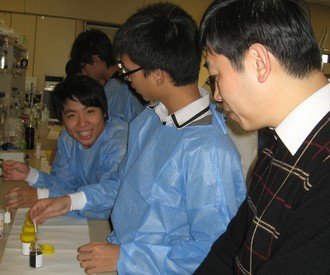Something to Chew On
Tooth decay is an unpleasant experience that we all want to avoid and the Faculty of Dentistry has been educating young people in schools for years on how to do so. But tooth decay is also something else: an example of science in our everyday lives.
Tooth decay is an unpleasant experience that we all want to avoid and the Faculty of Dentistry has been educating young people in schools for years on how to do so. But tooth decay is also something else: an example of science in our everyday lives.
On that premise, the Faculty has developed a program that aims to facilitate science learning, especially biology and chemistry, using dental examples.
"In the past we have done oral health talks, but we also wanted to do something broader that directly related to school studies," says Professor Edward Lo Chin-man. "There is an excellent scientific basis behind dental disease processes that can be used to facilitate student learning about science topics such as bacteria, bacterial communities called biofilm, pH and infectious diseases."
The Faculty compiled some teaching materials and organized workshops in 2010 and 2011 for secondary school teachers and a few of their best students to demonstrate to them how the materials can be used in their school setting.
The participants looked at their own mouths to see what microbes were present and analyzed the acidity of popular drinks, which can contribute to tooth decay and chemical erosion of teeth.
"We showed them real objects and things that they come in contact with in their daily lives," Professor Lo says.
"We tried to think out of the box rather than just focus on our professional knowledge. The intention was to go into the community and see what they needed, and provide it for them, rather than use top-down teaching to teach them our knowledge of dental health."
"We also tried to learn from what the teachers and students were learning so it was an exchange rather than a one-way approach."
The result has been a lot of positive feedback from participants and a body of materials – posters and teaching materials – that teachers can use in class. The materials have been adapted to make them more suitable for secondary schools, for instance by using a safe and simple stain to make bacteria visible under the microscopes used in schools.
Since the initial workshops, the Faculty has also received funding to continue running additional workshops at a rate of two or three a year catering for about 15 schools each time.
"We've been able to demonstrate how real-life dental problems can form the basis of interesting, interactive science lessons," Professor Lo says.
Professor Edward Lo and his team received the Faculty Knowledge Exchange Award 2012 of the Faculty of Dentistry for the "Enhancing Student Learning of Biological Sciences through Capacity Building of Secondary School Science Teachers" project. The list of team members can be found here.


